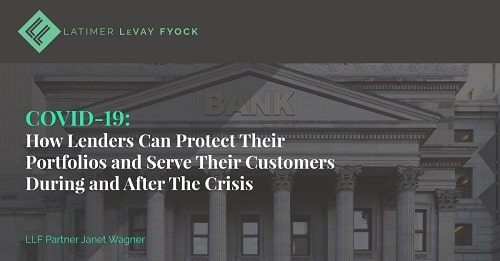COVID-19: How Lenders Can Protect Their Portfolios and Serve Their Customers During and After The Crisis

The specter of the COVID-19 pandemic hangs ominously over the banking industry. So too do the ghosts of the 2008 financial crisis. Lenders of all sizes are confronting a volatile and dangerous landscape that may exceed the disruptions of a dozen years ago. Banks face concurrent and often contradictory pressures in terms of minimizing the potential for large-scale defaults on unsecured loans while also responding to the requests of individual and small business customers who desperately need cash to survive the indefinite suspension of their operations and income.
Even putting aside the new challenges and issues raised by coronavirus initiatives like the Paycheck Protection Program, lenders need to take fundamental steps to protect their asset portfolios. This may include difficult decisions about accommodations on loan terms and extensions of credit that they would not entertain under normal circumstances.
Early and Open Communication
The uncertain path and duration of the pandemic along with the multi-faceted legal and regulatory responses at the federal, state, and local levels mean that customers have urgent needs and constant questions about what if anything their lender can do to assist them.
Banks are trying to do all they can to be responsive to those queries both in their general messaging and in direct responses to individual and business customers. Strike a tone of empathy and shared concern, and indicate a willingness to work with them throughout the crisis to find mutually acceptable solutions.
The pandemic is not affecting all borrowers and industries in the same way. By keeping the lines of communication open, lenders can get a better understanding of the risk posed by each borrower and develop tailored strategies to minimize the likelihood of default. When communicating offers of accommodation, do so in writing and be precise about what it is you are amenable to, particularly the duration and extent of any modifications and what the borrower’s obligations are when the period of accommodation ends (e.g., recommencing principal payments and when deferred payments will be due).
Crisis as Opportunity
“In the midst of every crisis, lies great opportunity,” as Albert Einstein once said. In current conditions, lenders who are making modifications and alterations to credit facilities have the opportunity to review, identify, and fix any deficiencies in their loan documentation. Lenders can also use modifications as a chance to get borrowers to reaffirm their obligations, obtain releases, or stop mutual deviations from the loan terms.
Hard Questions For Lenders
Questions lenders need to consider and quickly answer include:
- When should they stop advancing credit under a material adverse change or other similar loan provision?
- When should they declare a non-monetary default based on a financial covenant?
- Should or can they proceed with foreclosures, enforcement actions, or acquisition of collateral in the event of default? Has the borrower’s jurisdiction limited the ability to move forward with foreclosure or put on hold any pending or new proceedings?
- Should they consider allowing commercial property borrowers to make short-term amendments to their retail leases?
- Is it feasible to allow a borrower to make interest-only payments for several months or for the duration of the crisis?
- How will any forbearance or other accommodation impact their preference or prejudice them in any future bankruptcy or assignment for the benefit of creditors?
- How willing should they be to extend credit to new customers rather than simply working with existing and known borrowers?
This crisis is both unprecedented and unpredictable, two conditions that are anathema to lenders and other financial institutions. Throughout this challenging period, the lawyers of LLF’s Banking, Finance & Creditors’ Rights Group remain committed to helping our clients navigate these uncharted waters with strength, security, and clarity. Please contact us to discuss your questions and concerns.


